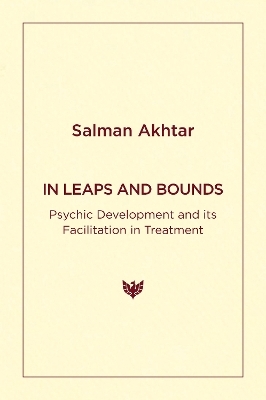
In Leaps and Bounds
Phoenix Publishing House (Verlag)
978-1-912691-91-3 (ISBN)
Salman Akhtar presents three rich essays brimming with psychoanalytic theory on personality development and how such knowledge enhances treatment. Essay 1 starts at the earliest infancy and takes the reader all along the path past adolescence. It addresses key developmental landmarks, including:
- Establishing a satisfactory parental bond
- Moving towards autonomy and independence
- Acquiring a moral sense
- Consolidating identity
Essay 2 picks up after adolescence. It addresses the psychosocial challenges characteristic of young adulthood, midlife, and old age, such as:
- Assuming the role of a wage-earner and 'house-holder'
- Enjoying sex, love, and marriage
- Downsizing and retiring from one's job
- Dealing with the deaths of friends and family and facing one's own mortality
Essay 3 builds upon the theory that has gone before and examines how a deepened understanding of psychic development can inform the clinician's approach. With an emphasis on development as a lifelong process, this essay provides clear guidelines for facilitating such growth, including:
- Creating psychic space for thinking
- Helping the patient find words for inner experiences
- Validating the patient's reality
- Enhancing the sense of personal agency in the patient.
The complex tapestry woven by these three essays is extended by a prologue and an epilogue. The prologue opens with the 'pre-self' – events before birth that impact on who we become. The epilogue discusses the 'post-self' – how we 'live on' as memories held by those who knew us.
In Leaps and Bounds deepens the understanding of the nuances of human development. It is key reading for practising and trainee psychoanalysts and psychoanalytic psychotherapists to enhance their clinical practice. It is highly recommended for all enquiring minds looking to expand their knowledge of what makes us who we are.
Salman Akhtar, MD, is Professor of Psychiatry at Jefferson Medical College and a Training and Supervising Analyst at the Psychoanalytic Center of Philadelphia. He has served on the editorial boards of The International Journal of Psychoanalysis, the Journal of the American Psychoanalytic Association, and the Psychoanalytic Quarterly. His nearly 400 publications include 99 books, of which the following 20 are solo-authored: Broken Structures (1992), Quest for Answers (1995), Inner Torment (1999), Immigration and Identity (1999), New Clinical Realms (2003), Objects of Our Desire (2005), Regarding Others (2007), Turning Points in Dynamic Psychotherapy (2009), The Damaged Core (2009), Comprehensive Dictionary of Psychoanalysis (2009), Immigration and Acculturation (2011), Matters of Life and Death (2011), The Book of Emotions (2012), Psychoanalytic Listening (2013), Good Stuff (2013), Sources of Suffering (2014), No Holds Barred (2016), A Web of Sorrow (2017), Mind, Culture, and Global Unrest (2018), and Silent Virtues (2019). Dr Akhtar has delivered many prestigious invited lectures including a Plenary Address at the 2nd International Congress of the International Society for the Study of Personality Disorders in Oslo, Norway (1991), an Invited Plenary Paper at the 2nd International Margaret S. Mahler Symposium in Cologne, Germany (1993), an Invited Plenary Paper at the Rencontre Franco-Americaine de Psychanalyse meeting in Paris, France (1994), a Keynote Address at the 43rd IPA Congress in Rio de Janiero, Brazil (2005), the Plenary Address at the 150th Freud Birthday Celebration sponsored by the Dutch Psychoanalytic Society and the Embassy of Austria in Leiden, Holland (2006), and the Inaugural Address at the first IPA-Asia Congress in Beijing, China (2010). Dr Akhtar is the recipient of numerous awards including the American Psychoanalytic Association’s Edith Sabshin Award (2000), Columbia University’s Robert Liebert Award for Distinguished Contributions to Applied Psychoanalysis (2004), the American Psychiatric Association’s Kun Po Soo Award (2004) and Irma Bland Award for being the Outstanding Teacher of Psychiatric Residents in the country (2005). He received the highly prestigious Sigourney Award (2012) for distinguished contributions to psychoanalysis. In 2103, he gave the Commencement Address at graduation ceremonies of the Smith College School of Social Work in Northampton, MA. Dr Akhtar’s books have been translated into many languages, including German, Italian, Korean, Persian, Romanian, Serbian, Spanish, and Turkish. A true Renaissance man, Dr Akhtar has served as the Film Review Editor for The International Journal of Psychoanalysis, and is currently serving as the Book Review Editor for the International Journal of Applied Psychoanalytic Studies. He has published 9 collections of poetry and serves as a Scholar-in-Residence at the Inter-Act Theatre Company in Philadelphia.
Acknowledgments
About the author
Introduction
Prologue
Chapter One: The pre-self
Part I: Conceptual basis
Chapter Two: From infancy through childhood to the end of adolescence
Chapter Three: From young adulthood through midlife to old age
Part II: Clinical praxis
Chapter Four: Development facilitating interventions
Epilogue
Chapter Five: The post-self
References
Index
| Erscheinungsdatum | 28.04.2022 |
|---|---|
| Sprache | englisch |
| Maße | 152 x 229 mm |
| Gewicht | 382 g |
| Themenwelt | Geisteswissenschaften ► Psychologie ► Entwicklungspsychologie |
| Geisteswissenschaften ► Psychologie ► Psychoanalyse / Tiefenpsychologie | |
| ISBN-10 | 1-912691-91-4 / 1912691914 |
| ISBN-13 | 978-1-912691-91-3 / 9781912691913 |
| Zustand | Neuware |
| Haben Sie eine Frage zum Produkt? |
aus dem Bereich


